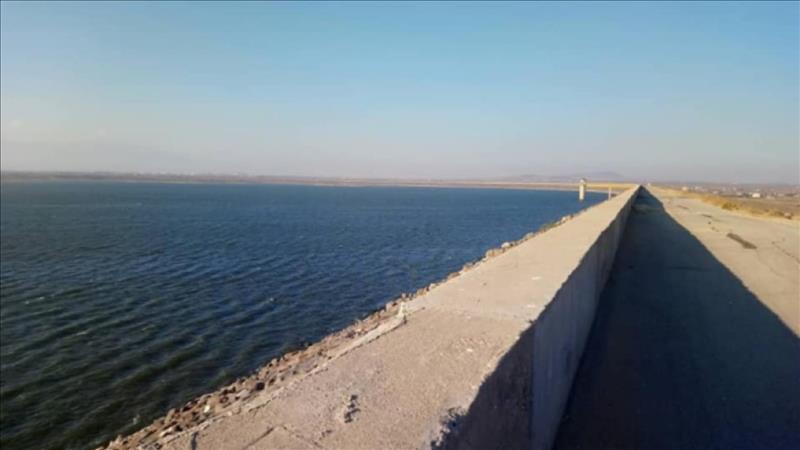
The Geopolitics Of Water: How Israel Leverages Water To Strengthen Its Influence In The Middle East
A crucial development in this context is the ongoing situation in Syria. With the collapse of the Assad regime and the ensuing instability, Israel has intensified its military operations in the occupied Golan Heights, particularly in strategically important border areas. A vital component of these operations is the control of the Al-Muntar Dam in the Quneitra countryside, which is crucial for providing water to large areas of southern Syria. This move, part of Israel's growing military presence in the region, fits into a broader strategy to assert dominance over Middle Eastern water resources, especially as the global water crisis intensifies.
Reports suggest that Israel's control over the dam extends beyond military objectives, aiming for long-term water sustainability amid resource scarcity. This approach also seeks to enhance Israel's regional influence, while weakening neighboring countries, especially Syria, which depends on local dams for water and agriculture.
The implications are far-reaching: Israel's control threatens water security for communities in Quneitra and Daraa, worsening the humanitarian crisis. It also heightens regional tensions, viewed as a violation of Syrian sovereignty, with the potential to spark border conflicts. Moreover, the situation raises international concerns about Israel's compliance with laws governing water resources in occupied territories.

Dr. Marwa El-Shinawy
Most notably, these actions illustrate how water has become a pivotal geopolitical asset for Israel, surpassing traditional military concerns. Israel utilizes water to solidify its dominance in the Middle East. By controlling key water sources such as the Jordan River and West Bank aquifers, Israel secures crucial resources that enhance its ability to influence the region. Furthermore, Israel seeks to leverage water as a tool against its neighbors, reinforcing its political and economic supremacy. In essence, the management of water resources is a critical element of Israel's broader strategy to strengthen its regional influence.
Israel's quest for control over water extends beyond its own territory and Palestinian areas; it also targets regional rivers like the Nile. Israel views control over the Nile's Ethiopian sources as a strategic move to bolster its water security and increase its influence in the Middle East, where water is essential for power and prosperity. To this end, Israel indirectly supports dam projects on the Blue Nile, including the Grand Ethiopian Renaissance Dam-one of Africa's largest water initiatives. This dam enhances Ethiopia's irrigation capacity while reducing Egypt's share of Nile water, altering the region's power dynamics.
Numerous reports and academic studies investigate Israel's covert backing of Ethiopian dams, suggesting that Israel sees strategic benefits in these projects, potentially securing future water agreements with Ethiopia or purchasing water for export to neighbouring countries. Additionally, research shows that the United States indirectly supports Israel in this endeavour, strengthening Israel's political ties in the region and contributing to a shift in priorities among major powers regarding regional water resources.
These studies argue that this strategy is not only about securing water but also reflects a broader vision aimed at diminishing the water influence of Arab nations, particularly Egypt, by gaining control over the Nile's sources.
Israel also uses water technology as a political tool, investing heavily in desalination and water recycling to become a global leader in the field. This investment has enabled Israel to effectively manage regional water crises while increasing its political leverage. Several Middle Eastern countries, including Jordan and Palestine, rely on Israel for water. For example, under a peace agreement, Israel supplies treated water to Jordan, fostering a dependency on Israeli resources. A 2023 report from Nature highlights how Israel uses these agreements to strengthen political and economic ties, using water technologies as strategic tools to reinforce its regional influence.
Since the founding of Israel in 1948, water resources have been a critical strategic concern, supported by major powers such as Britain and the United States. The Zionist movement's plans before statehood revealed a keen awareness of water's importance for the success of settlement initiatives.
The British Mandate played a crucial role in developing the water infrastructure needed to advance the Zionist agenda in Palestine, ultimately facilitating the establishment of Israel. Under the Sykes-Picot Agreement (1916) and the Balfour Declaration (1917), Britain sought to create favourable conditions for Jewish settlement, which included securing control over water resources. This involved redistributing water to benefit Jewish settlers, with the Mandate prioritizing water infrastructure development in predominantly Jewish regions, such as efforts to divert the Jordan River's waters to support new settlements. Treaties like the 1923 water agreement between Britain and France underscored the commitment to ensuring access to water for areas that would later fall under Jewish control, creating a structural imbalance that persisted for many years.
Following Israel's establishment in 1948, the United States became a crucial supporter, providing water and strategic aid. This included funding major projects like the National Water Carrier, which moved water from the Sea of Galilee to the Negev for agricultural purposes. The US also helped Israel develop desalination and water reuse technologies, bolstering its water independence in a resource-scarce region.
Additionally, the US played a key diplomatic role in securing Israel's access to regional water resources, pressuring during peace negotiations like the Camp David Accords to ensure Israel's access to water from the Jordan River and the West Bank. Washington also supported Israel in water-related conflicts with Lebanon and Syria by blocking UN resolutions that criticized Israeli water policies. Various studies emphasize US support as crucial in positioning Israel as a dominant water power in the Middle East.
In conclusion, Israel's control over water resources in the Middle East has become an increasingly urgent issue, especially in light of recent developments. Since the colonial era, Israel has employed a mix of military power and advanced technology to maintain dominance over water resources, undermining neighbouring communities' rights to their natural resources. Addressing this issue requires both regional and international cooperation to ensure fair distribution of water while respecting national sovereignty and the rights of local populations. With the challenges ahead, achieving water justice is essential for stability in the Middle East, unless comprehensive solutions are implemented to prevent the use of water as a tool of political conflict.
Dr. Marwa El-Shinawy – Academic and Writer

Legal Disclaimer:
MENAFN provides the
information “as is” without warranty of any kind. We do not accept
any responsibility or liability for the accuracy, content, images,
videos, licenses, completeness, legality, or reliability of the information
contained in this article. If you have any complaints or copyright
issues related to this article, kindly contact the provider above.


















Comments
No comment